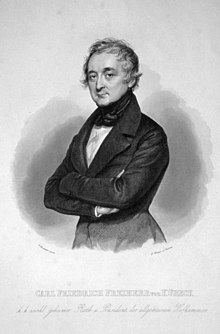Karl Friedrich von Kübeck

Karl Friedrich von Kübeck , Freiherr von Kübau (born October 28, 1780 in Iglau , Moravia ; † September 11, 1855 in Hadersdorf near Vienna ) was an Austrian statesman .
Life
He studied in Vienna and Prague and entered the civil service in Olomouc in 1800 . During his studies he was in contact with Ludwig van Beethoven from 1796 to 1801 , as can be found in his diary. Kübeck's outstanding talent and hard work enabled him to complete his studies in the shortest possible time. Knowing all the "normalities" of the Austrian state administration made him indispensable for his superiors. At the age of 35, Kübeck was already a councilor with an annual salary of 5,000 guilders. In 1840 he was appointed President of the Hofkammer, and in 1850 President of the Reichsrat. In 1815 he was raised to the herbland knighthood, in 1825 he was given the title of baron.
His steep civil service career had the following stages:
- 1809 Councilor at the court chancellery
- 1812 Councilor at the court chancellery
- 1814 Adviser in the State Council for financial matters
- In 1815 he and Franz von Pillersdorf propose the establishment of a national bank.
- 1821 State and Conference Council. Accompanying Emperor Franz I to the congresses in Ljubljana and Verona
- 1825 Elevation to the baron class
- 1839 Reorganization of the general accounting office.
- 1840 President of the Court Chamber
- 1841 Appointment as head of the coin and mining industry
- In 1846 he laid the foundation for the Austrian telegraph network .
During this time he advocated strong state authority and moderate reforms in the spirit of the Enlightenment . In 1848 he left the civil service and took over the finance ministry in the first revolutionary government in 1848, was elected to the Kremsier Reichstag and the Frankfurt National Assembly. In the course of the revolution, Kübeck became an advocate of a conservative absolutist conception of the state. As a confidante of the young Emperor Franz Joseph , he drafted the constitution of 1849 together with Franz Graf Stadion , but at the end of 1851 persuaded the Emperor to repeal the constitution and switch to neo-absolutism , the principles of which he himself designed. He was instrumental in drafting the statutes of the Reichsrat , of which he became president. His diaries are an important historical source for the first half of the 19th century.
In 1876 the Kübeckgasse in Vienna- Landstrasse (3rd district) was named after him.
Fonts
- Friedrich Walter (Ed. And Eigel.): Carl Friedrich Frhr. Kübeck von Kübau: From the estate of Baron Carl Friedrich Kübeck von Kübau. Diaries, letters, files (1841–1855) (= publications of the Commission for Modern History of Austria . 45). Böhlau, Graz and others 1960.
literature
- Baron von Kübeck . In: Illustrirte Zeitung . No. 29 . J. J. Weber, Leipzig January 13, 1844, p. 33-34 ( books.google.de ).
- Constantin von Wurzbach : Kübeck Freiherr von Kübau, Karl Friedrich . In: Biographisches Lexikon des Kaiserthums Oesterreich . 13th part. Kaiserlich-Königliche Hof- und Staatsdruckerei, Vienna 1865, pp. 308–311 ( digitized version ).
- Franz Freiherr von Sommaruga: Kübeck von Kübau, Carl Friedrich Freiherr . In: Allgemeine Deutsche Biographie (ADB). Volume 17, Duncker & Humblot, Leipzig 1883, pp. 279-283.
- Meyers Konversations-Lexikon . 5th edition, Bibliographisches Institut, Leipzig / Vienna 1895.
- Harm-Hinrich Brandt : Kübeck von Kübau, Carl Friedrich Freiherr. In: New German Biography (NDB). Volume 13, Duncker & Humblot, Berlin 1982, ISBN 3-428-00194-X , pp. 169-171 ( digitized version ).
- Josef Neumayer: Development of Kübeck's worldview . Dissertation. University of Vienna, Vienna 1953.
Individual evidence
- ^ Diaries of Carl Friedrich Freiherrn Kübeck von Kübau, Vienna 1909, Volume I.
| personal data | |
|---|---|
| SURNAME | Kübeck, Karl Friedrich von |
| BRIEF DESCRIPTION | Austrian statesman |
| DATE OF BIRTH | October 28, 1780 |
| PLACE OF BIRTH | Iglau , Moravia |
| DATE OF DEATH | September 11, 1855 |
| Place of death | Hadersdorf near Vienna |